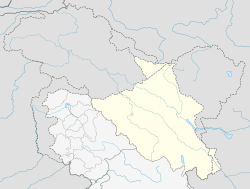Sankoo
Sankoo | |
|---|---|
 A lush green barley field at Kausar, Sankoo in Kargil district | |
| Coordinates: 34°17′N 75°56′E / 34.28°N 75.94°E | |
| Country | |
| Union Territory | |
| District | Kargil |
| Tehsil | Sankoo |
| Population (2011) | |
• Total | 40,548 |
| Languages | |
| • Official | Ladakhi, Hindi |
| • Spoken | Ladakhi, Balti, Purgi |
| Time zone | UTC+5:30 (IST) |
| PIN | 194301[1] |
Sankoo[a] (Wylie: sang ku) is a town in a valley within the Kargil district of the Union Territory of Ladakh, India. This township is located approximately 42 kilometers south of the town of Kargil. The valley is shaped like a bowl and is fed by several large tributary streams of the Suru River, as well as the Nakpochu river.
Administration
[edit]Sankoo constitutes a sub-division within the esteemed jurisdiction of District Kargil.The administration of the sub-division is under the jurisdiction of the Sub Divisional Magistrate (SDM). Currently, Mrs. Kaneez Fatima serves as the SDM of Sankoo.Subdivisions are further divided into tehsils, which are administrative units responsible for revenue collection and other related matters. Each tehsil is headed by a Tehsildar.
Within the Sankoo region, there exists a singular CHC hospital and an Aga Syed Haider Rizvi Memorial Higher Secondary School. Additionally, several villages are scattered throughout the area, including Sangra, Stakpa, Umba, Lankarchay, Thasgam, Barso, Farona, and Nagma Kousar.
To provide medical assistance to the region's residents, there is a solitary CHC hospital,
Education
[edit]Education is facilitated through the Aga Syed Haider Rizvi Memorial Higher Secondary School. The Sankoo region is composed of multiple villages, such as Sangra, Stakpa, Umba, Lankarchay, Thasgam, Barso, Farona, and Nagma Kousar, each contributing their unique flavor to the local community. There are two noteworthy public schools: Noon Public High School and Sankoo Public School. Both of these educational institutions operate under a private-public model, providing students with a quality education that is accessible to all.
Demand for new district
[edit]In February 2020, In freezing temperatures of minus 10 °C, approximately 3,000 people assembled in Sankoo, located in Kargil, to demand district status for their region. The attendees braved the bitter cold to make their voices heard, highlighting the significance of their cause. The demonstration demonstrated the unwavering commitment and determination of the people of Sankoo to achieve their goals and secure the well-being of their community.The new Union Territory of Ladakh, which was created after the unilateral bifurcation of the erstwhile Jammu and Kashmir state and the reading down of Article 370, now has two districts – Leh and Kargil – with about equal population distribution.
Further, Kargil has four sub divisions – Kargil, Zanskar, Sankoo and Shakar-Chiktan. The protesters in Sankoo are demanding that Zanskar and Sankoo be turned into a separate district to allow for better governance.
They argue that the area is remote and several parts are cut off from the district headquarters in Kargil during the heavy snow winter months, making service delivery a complicated challenge for the people of Zanskar and Sankoo.
The protests was organised by an organisation called Youth Sankoo and supported by major religious organisations like Anjuman-e-Sabib Zaman, Anjuman Enqilab-e-Mehdi Suru and Maktab-e-Imam Raza Sankoo and political parties including the Congress and the National Conference. .[2]
Climate
[edit]Summers are mild and warm in Sankoo, but the winters are extremely cold and harsh. Temperatures are most comfortable in April and September. As a result of global warming, the most widely reported impact is a rapid shrinking of glaciers, which has profound future implications for downstream water resources. Some of these diminishing glaciers are the Nangma Serpo glacier, Batacho glacier, Umba Glacier and Gangshanmo. A study of these glaciers has yet to be done.[3][unreliable source?]
Geography
[edit]The Kartsey Khar valley is located in Sankoo. One of the highlights of the valley is the Chamba monastery, which happens to be one of the largest Buddhist monasteries in Asia. Additionally, the valley is also home to the famous graveyard of historical Muslim Queen Rgyal Khatoon.
Tourism
[edit]Picnickers come to the area from Kargil town and other places. There is also a place of pilgrimage, the shrine of a Muslim scholar-saint, Sayed Mir Hashim, who was invited from Kashmir to impart the religious teachings to the region's Buddhist ruler, Thi-Namgyal of the Suru principality, following his conversion to Islam in the 16th century. The shrine is in the village of Karpo-Kharon on the outskirts of Sankoo.[4][unreliable source?]
See also
[edit]Notes
[edit]- ^ Alternative spellings: Sanku, Sankhu, Sankho and Sankhoo.
References
[edit]- ^ "Sankoo (Google Maps)". Google Maps. Retrieved 5 April 2020.
- ^ "3,000 Demonstrate for Separate District in Sub-Zero Temperatures at Kargil". The Wire. Retrieved 4 May 2023.
- ^ "List of Tourist Attractions | Tourist Places to Visit in Sankoo". www.nativeplanet.com. Retrieved 18 February 2015.
- ^ Sankoo in Ladakh - Tourist Places, Leh Travel, Village Tour, Culture, Travel Attraction, Trekking, Mountaineering, Tourist Information Centre India


